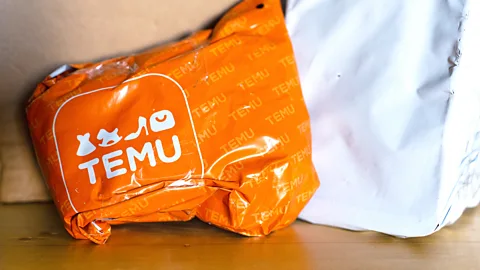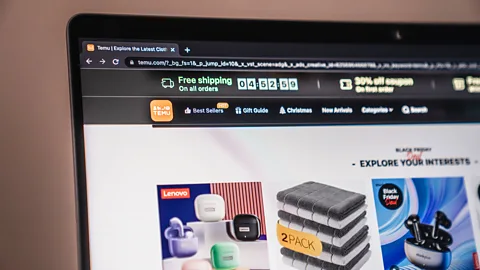'Temu is as addictive as sugar': How the ecommerce retailer drives a shopping frenzy

With flash deals, gamificiation and rock-bottom prices, shoppers are finding Temu nearly impossible to resist.
When Manchester-based Lucy Clark first logged on to the viral retail app Temu in 2023, she felt like she was in a virtual casino. A spinning roulette wheel touted tantalising cash coupon rewards; countdown timers – precariously close to running out – promised free delivery; and lightning bolts advertising flash discount deals streaked across her screen.
"I'd heard about Temu on TikTok, with people showing off their hauls and sharing promotional codes," says the 27-year-old marketing director. "Everyone I know has at least been on Temu [once] and had a look. I wasn't searching for anything in particular."
Barraged with a bewildering array of dirt-cheap home gadgets, electronic devices and novelty items, Clark decided to buy some squeaky dog toys for Rickson, her mother's French Bulldog. They cost a fraction of the price she'd pay at retail stores like Pets at Home or even online at Amazon.
She was unfazed by Temu's two-week delivery window – glacial by Amazon's standards, but realistic according to her experience with Shein, where Clark has shopped for several years. "I could pay extra to get it expedited," says Clark, "but I'm never that desperate for the stuff I'm ordering."
Temu's eclectic emporium of stuff is just that – rarely are they necessities, but the scrapyard symphony has something for everyone. If you've imagined it – and perhaps even if you haven't – Temu has it: from beard-trimming bibs to mini toilet golf, tiny printers, avocado slicers or swanky hoodies for your car's gear stick.
Clark knows quality isn't guaranteed, but she writes that off as just a part of the shopping experience. "You're either going to get something really good and an absolute bargain. Or you get something that's a bit naff, but won't actually return it, because it's less than £10 so it's not worth your time," she says.
 Courtesy of Lucy Clark
Courtesy of Lucy ClarkTemu's approach to pricing and how it promotes products, say experts, is deliberate – pushing the exact consumer psychology buttons necessary to keep shoppers shopping. And "gamification" – the practice of implementing gaming-related elements into the ecommerce experience – is increasingly common. Customers are encouraged to keep shopping with the introduction of bonuses and coupons that mimic the rewards you might accumulate in a video game.
Now, brands worldwide are attempting to cash in on this phenomenon, incorporating spin to win features, quizzes and elabourate referral systems on their sites. Even iconic brands such as Starbucks and Sephora have added gamified elements to their online reward programmes; Lacoste has a crocodile hunt game in which shoppers unlock prizes in its virtual store.
Few brands, however, do all these things simultaneously and as conspicuously as Temu. The billion-dollar Chinese shopping platform is designed to get consumers' brains firing on all cylinders, and stoke the frenzied shopping for which they're now famous. What is Temu's secret – and does its formula set the stage for the future of shopping?
Sickly sweet
"Temu is as addictive as sugar," says retail analyst Neil Saunders. "The experience and cheap prices give consumers a little dopamine hit and keeps them coming back for more." Regular promotions increase engagement, he adds, and the chaotic interface of the website creates the illusion for consumers that they can "dive in" and rummage around to discover a great deal – especially finding them if they move quickly.
Mark Griffiths, professor of behavioural addiction at Nottingham Trent University, UK, agrees. "They've mixed shopping and gamification really well. Temu's marketing strategy means you are literally having to browse to get your rewards."
He explains that Temu utilises the "perceived urgency aspect" by using timers and countdowns to convince customers that deals are running out. He likens it to the strategy behind slot machines, where the sounds associated with button pushing heighten arousal levels.
Temu has even carved a space separate from brands such as Shein, even though the two are often compared, as ultra-fast fashion brands are known for eye-wateringingly low prices. While both are often in the headlines for competitive rivalries, Temu takes gamification one step further.
"Temu often employs a combination of social proof, scarcity and frequently uses animated elements to capture consumers' attention, more so than Shein and Wish," explains Vilma Todri, an associate professor of Information Systems at Goizueta Business School at Emory University, US, who researches the impact of Internet-related technologies on consumer behaviour and previously worked at Google.
The retailer also relies heavily on social proof as "a highly effective persuasive technique," adds Todri. If something catches your eye, there's a slew of ways Temu keeps you engaged with the product. A shopper may see a product's review and number of five-star ratings, how many people purchased it in the past 24 hours and the number of customers who currently have the product in their carts. All this, explains Todri, provides evidence of the product's supposed quality and popularity, psychologically tapping in to our desire to conform or join in.
 Getty Images
Getty Images'A spiral'
Some users claim Temu's tactics work so well, they've become addicted to the sales platform. Griffiths is sceptical of the claim. Barring a small minority of individuals with the propensity to spend more than 10 hours shopping online each day, he believes it is unlikely Temu alone could be an all-consuming addiction in the clinical sense of the word.
Still, the gaming elements could drive consumers to part with their money unwisely. "I don't think people would spend all day, every day on Temu... but like gambling, shopping is a commercial activity and even if you're not spending great amounts of time, you might be going beyond your disposable income," he says.
Addiction or not, a steady drip-feed of these marketing tactics can have a lasting effect. Luring consumers with the promise of free gifts, "[Temu] then kind of takes you down a spiral", says Griffiths, and many consumers share anecdotally there always seems to be one last hurdle before the promised reward, such as referring more friends.
Is the genie out of the bottle?
If consumers are so drawn to these types of marketing approaches, other brands may be tempted to adopt them, too – or even feel like they have no choice if they want to compete with the behemoth that is Temu. Yet even if they do take a similar approach – integrating gamified shopping and rock-bottom prices – it doesn't guarantee success.
In fact, say experts, Temu may be impossible to compete with, mostly due to its business model. First, Temu is able to offer such low prices because they're betting on a long-term strategy of operating at a loss in order to scale to the point that they squeeze out nearly all competition.
Elizabeth Clark, cofounder and CEO at Dream AI ltd, a UK-based AI company that specialises in ecommerce is already seeing the threat of Temu play out in the UK market. "You can't compete on price with Temu. It's a tremendous business case. They've not had to put money into the logistics or the manufacturers. [It's] a poor man's, accelerated version of Shein and Amazon," says Clark – who is also the mum of Temu shopper Lucy. (Elizabeth was "appalled" when she discovered her daughter was getting toys for "her precious Frenchie" from the retailer.)
Therefore, for smaller brands, Temu's aggressive growth strategies and ultra-low prices are impossible to emulate, she says. Clark has been sounding the alarm bell, and sees her clients struggle when confronted with the ecommerce giant first hand. "At the start of last year, Temu was kind of nowhere in the US, but by the end, certain companies couldn't even buy products at the price Temu was selling them," she says.
More like this:
Yet for all Temu's power, the company is not impenetrable. Despite being just more than a year old, Temu is already under regulators' lenses for data breaches and exploiting trade loopholes, such as the De Minimis Value threshold in the US, in which orders valued less than $800 (£642) are exempt from duty. There have also been a spate of new probes into the ethics of its business model, and Temu consistently battles serious allegations of slave labour as US lawmakers warn the website may sell forced labour goods.
Now, its sheer growth in Europe (at 75 million users in the EU, it surpasses the threshold of 45 million users that makes it a VLOP – very large online platform – according to EU regulations) means it will likely face more stringent monitoring, even as the sheer number of the site's offerings make consistent review difficult in practice. In the US, efforts to regulate Temu's handling of data has bred calls from lawmakers to investigate or ban the app outright.
And although Temu's interface may seem irresistible, Todri thinks that over time, consumers may tire or become wary of the company's relentless gamified approach. "As consumers become more accustomed to the marketing and business strategies Temu utilises, they might become more sceptical."
But we're not there yet. For Lucy Clark, Temu is still appealing. Despite what she and her mother describe as "the horrific smell of chemicals" coming from the dog toys she purcahsed, Rickson loves them. Some have fallen apart – but, says Lucy, in Temu's defence the higher-priced versions would have met a similar fate, anyway.
It's why she finds herself continuing to patronise Temu. Simply, she says, the price is right. "They're only £2 each."
--
If you liked this story, sign up for The Essential List newsletter – a handpicked selection of features, videos and can't-miss news, delivered to your inbox twice a week.
